Episodes
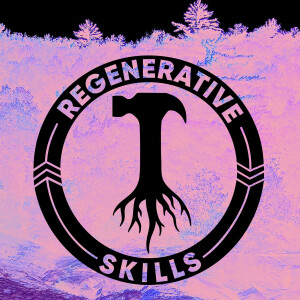
Friday Aug 26, 2022
Friday Aug 26, 2022
This week I wanted to get back to one of my favorite formats from the early days of this show in which I just take the time to speak with some of my close friends and collaborators about what we’re working on. Today I grabbed my good friends Nick Steiner and Jacob Evans.
Nick is one of my closest colleagues in my work with Climate Farmers. He leads the Academy at the company and has spearheaded the coach matching service where we put farmers in touch with other farmers and experts who can help them in their transition to regenerative agriculture. He also recently invested in a property in Tenerife, the largest of the Canary Islands and has been renovating an off-grid homestead for the last several months.
Jacob is another close friend of mine and earlier this year we taught an introductory course on syntropic agroforestry at the Green Rebel farm in Miravet, Spain. Jacob has been teaching syntropic agroforestry for arid climates and managing the farm at Suryalila Yoga retreat center for the last few years. He is also in the early stages of a big transition as he moves his young family back to Argentina where his wife is from, and will be starting a small farm there later this year. He also has a lot of experience setting up and running food production systems in the challenging climate of southern Spain.
The reason why I called on these guys is because most of the clients that come to me and the students that join in my courses are working towards a big transition onto the land. Some are in the early stages of considering buying land and starting a farm. Others are actively looking for property, and some have already bought a place and are beginning the development process. As a result I get tons of questions about how to choose a property, what important things they should be looking for, what to prepare for and be aware of, how to avoid mistakes, etc.
I myself am in the process of working to move onto a property in the mountains of central Catalunya in Spain and am drawing from my own learning journey from the past when I began my first homestead with my colleagues in Guatemala almost 5 years ago. I know now that there are so many things I would do differently with more knowledge and hindsight.
Because of all this shared experience me and the other two guys have in common with making and preparing for this type of lifestyle transition I wanted to have an in depth chat about the most important learnings we gained from these experiences. We also talk a lot about what we’ll be drawing from in our new endeavors and the advice or guidance we would give our former selves based on what we’ve learned from so many mistakes and blunders.
It’s really interesting to me to understand the patterns and commonalities that come out even from the different circumstances and motivations that we’ve had and that I’ve heard from all my students and clients over the years.
If you like exploring this topic and want to hear more about it after this episode, I’ve posted the details of the upcoming instagram live session that I’ll be doing with Nick this weekend on Saturday evening. We’ll be answering listener questions about learnings and important considerations when looking for land in the country and the reality of making that kind of a lifestyle transition so be sure to check it out. We’d love to see you there.
With that out of the way, let’s get started with the first of what I hope will be a lot more regenerative roundtable sessions.
Join the discord discussion channel to win a copy of Coppice Agroforestry and learn new skills with the whole community
Links:
https://www.instagram.com/regenerative_skills/
https://www.instagram.com/permanick_permaculture/
https://www.instagram.com/wizard_permaculture/
climatefarmers.org
Jacob's land in Portugal for sale
https://m.youtube.com/watch?v=IDypfVMrP4s
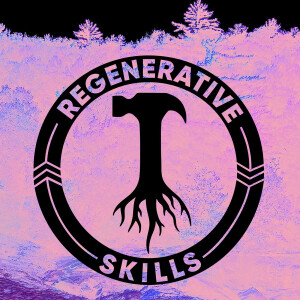
Friday Aug 19, 2022
Friday Aug 19, 2022
I’ve been taking it easy since my sister and her little girls are over visiting from Kuwait for the month and my Granny on the Isle of Man was also able to stop by for a week. So for that reason I’m going to rebroadcast one of my favorite episodes on agroforestry from two seasons ago with Patrick Worms. I hope all of you out there are also finding time to unwind and enjoy this summer despite all the challenges and extremes we’re experiencing.
With regenerative agriculture and agroforestry increasingly becoming popular topics in environmental and even political circles. I wanted to do a one-on-one session with one of my favorite speakers in this sphere, Patrick Worms.
Many of you frequent listeners will remember him from the panel discussion on agroforestry two weeks ago that I hosted with Climate Farmers.
I got to know Patrick’s work and perspective more intimately as part of the online course on ecosystem restoration design that we both teach on.
Patrick is the Senior Science Policy Advisor at World Agroforestry, President of the European Agroforestry Federation, and trustee of the International Union of Agroforestry, he’s also a valued member of the advisory council with the Ecosystem Restoration Camps.
In the courses and conversations I’ve seen with him, I’ve always been struck by the stories and compassionate understanding of the people that Patrick has met in his work and travels.
In order to make some of these stories and insights available to you listeners, I let go of the usual focus just on actionable information to let this chat take its own course.
Though we still cover a lot of practical advice in this talk, what I often take away from listening to Patrick is a renewed reverence for the individual people who are working to manage their lands and produce food around the world.
It’s easy to think of agriculture and the food industry as these monoliths without faces, but the lives of the people who make up these systems, from those to tend the land all the way through the logistics, distribution, transportation, all the way to our kitchens are important to remember ad pay attention too as well.
To get us started off with some background though, Patrick shed some light on the history of agroforestry and it’s deep traditions in Europe specifically.
Join the discord discussion channel to win a copy of Coppice Agroforestry and learn new skills with the whole community
Links:
https://www.worldagroforestry.org/
https://www.cgiar.org/
https://euraf.isa.utl.pt/welcome
https://www.iufro.org/
https://www.evergreening.org/
https://ejpsoil.eu/
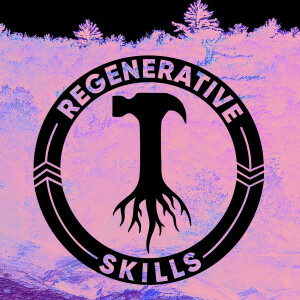
Friday Aug 12, 2022
Friday Aug 12, 2022
Though we’re quite a few episodes into this series on tree planting and agroforestry already, I had a unique opportunity to go back to the roots and explore some of the fundamentals of the plant kingdom and how we can actively work to preserve the wonder and diversity of vegetative life.
The truth is that the challenges of climate change and ecosystem mismanagement aren’t only having an effect on humans and animals. Despite the fact that plants make up the vast majority of living biomass on earth, they’re just as vulnerable in their own unique ways to warming climates, missing elements in their food webs, natural disasters and other challenges.
In order to get a better understanding of both the beauty of life in the plant kingdom and the difficulties of caring for such broad and diverse lifeforms, I spoke with Paul Nicholson, horticulturalist with the Royal Botanical Gardens of Sydney Australia.
Paul has nearly 30 years working as a horticulturist curating diverse collections such as: palms, camellias, begonias, succulents and Australian rainforest plants. He also instigated and helped develop the Cadi Jam Ora – First Encounters garden and Spring Walk and Palm Grove restoration programs. Paul is especially motivated to help people understand that plants are central to their lives, that plants are interesting, exciting, engaging and the more time you spend with plants the happier you are likely to be. His role as a tour guide and volunteer program manager has also given him an incredible ability to communicate his passion for his work and the collections at the gardens.
Since we’re already so far into this series exploring trees and various configurations of reforestation, this episode is a good chance to reconnect with the full range of the wild and wonderful world of plants, botany and horticulture in order to see it as a more complete picture.
Join the discord discussion channel to win a copy of Coppice Agroforestry and learn new skills with the whole community
Links:
https://www.rbgsyd.nsw.gov.au/
https://www.instagram.com/rbgsydney/
https://www.facebook.com/RBGSydney/
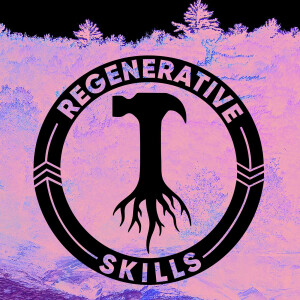
Friday Aug 05, 2022
Friday Aug 05, 2022
Welcome back to another episode in this ongoing series on tree planting and agroforestry. Today we’re going to pick up where we left off last week in our conversation with Mark Krawczyk about the practice of coppicing woody perennial plants and woodland management as a whole.
For a quick recap, Mark Krawczyk is the author of the new book Coppice Agroforestry: Tending trees for product, profit, & woodland ecology. Mark is an applied ecologist, educator, and grower incorporating the practices of permaculture design, agroforestry, natural building, traditional woodworking, and small-scale forestry. He owns and operates Keyline Vermont LLC, providing farmers, homeowners, and homesteaders with education, design, and consulting services. He and his wife also manage Valley Clayplain Forest Farm, 52 acres of field and forest in New Haven, Vermont.
Despite the focus on coppice agroforestry systems that this conversation continues to revolve around, Mark and I also go into a wide array of other topics including the long history of forestry management in indigenous cultures around the world, understanding invasive species, woodland products and small craft economies, fire mitigation strategies, and a whole lot more.
This is the second of the two part episode, and if you missed the fist portion, I highly recommend you go back and have a listen because it’s really worthwhile and it’ll help put more of what we’re talking about today into context. Another bonus that comes along with this episode is that thanks to New Society, the publishers of this book, I’ll be offering a free volume of Coppice Agroforestry to listeners of this show. And yes, even though I first announced this last week, there’s still a chance to win. Be sure to stay tuned until the end of the episode where I’ll let you know how you can win your own copy.
Join the discord discussion channel to win a copy of Coppice Agroforestry and learn new skills with the whole community
Links:
https://www.keylinevermont.com/
http://www.coppiceagroforestry.com/
https://www.valleyclayplain.com/
Book recommendations
Sproutlands
Tending the wild
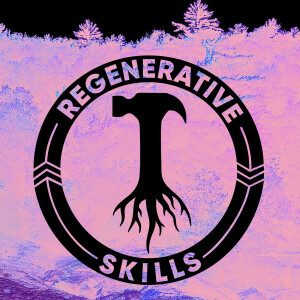
Friday Jul 29, 2022
Friday Jul 29, 2022
Welcome back to another episode in this ongoing series on tree planting and agroforestry. So far we’ve taken a broad look at many types of reforestation and how to integrate trees and woody species into farming systems, but there’s another side of the coin in this conversation. Today we’re going to start another two part session focusing on the management of woody perennials, specifically the practice of coppicing.
In order to get a better understanding of this ancient woodland management system I reached out to Mark Krawczyk, the author of the new book Coppice Agroforestry: Tending trees for product, profit, & woodland ecology. Mark is an applied ecologist, educator, and grower incorporating the practices of permaculture design, agroforestry, natural building, traditional woodworking, and small-scale forestry. He owns and operates Keyline Vermont LLC, providing farmers, homeowners, and homesteaders with education, design, and consulting services. He and his wife also manage Valley Clayplain Forest Farm, 52 acres of field and forest in New Haven, Vermont.
Despite the focus on coppice agroforestry systems that this conversation will revolve around, Mark and I also go into a wide array of other topics including the long history of forestry management in indigenous cultures around the world, understanding invasive species, woodland products and small craft economies, fire mitigation strategies, and a whole lot more.
Since the conversation spanned an hour and a half, I split it into two parts so it’s not too much of a marathon to get through in one go.
Join the discord discussion channel to win a copy of Coppice Agroforestry and learn new skills with the whole community
Links:
https://www.keylinevermont.com/
http://www.coppiceagroforestry.com/
https://www.valleyclayplain.com/
Book recommendations
Sproutlands
Tending the wild
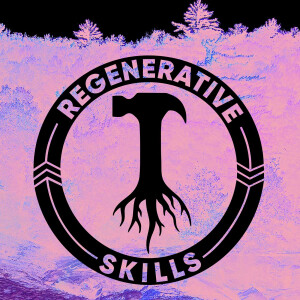
Friday Jul 22, 2022
Friday Jul 22, 2022
Welcome back to this ongoing series on tree planting and agroforestry. This week we’ll wrap up the two part interview I did with Philipp Gerhardt, the founder of the website baumfeldwirtschaft.de (which translates basically to tree farming) and managing director of Deutsche Agroforst GmbH. He is considered a leading expert for keyline design in Central Europe and is active in research projects and as a lecturer in seminars. As a pioneer in agroforestry, he has developed new approaches with his team to implement modern agroforestry and water management systems. Together they develop holistic concepts for protection against drought and floods for companies or municipalities with elements from Keyline Design and regenerative agriculture, and climate-friendly forest conversion. He has advised numerous companies that are changing the landscape in the long term and are building new climate-friendly ways of doing business.
As a quick recap of what we discussed in the first part of this interview, we covered some of the history and early innovators of the formal science of forestry. Philipp described his personal journey into the study of forest management and also permaculture and ecological restoration through keyline design as well as how all of these design concepts fit together. We also explored the potential for low density agroforestry planting over a large enough area to have a massive effect on the way we experience climate change on the ground. If you haven’t yet listened to the first half, I highly recommend that you check it out.
In this conclusion to our conversation, Philipp and I explore some of the unique roadblocks to implementing the scale of agroforestry needed to feel the difference in cooling and increased humidity. Philipp also breaks down some of the opportunities for funding at a national level in Germany and some ways he’s found to navigate the subsidy and regulation system there. That leads into an exploration of the career and business potential in forestry management and agroforestry as well as advice for people getting started in these fields or aspiring to work in ecological regeneration.
This is a great portion of the conversation for those of you who are looking into getting into these lines of work even if your funding and regulatory structures are different from those in Germany.
Swale / keyline design from Germany in the 1960s
Join the discord discussion channel to answer the weekly questions and learn new skills with the whole community
Links:
http://baumfeldwirtschaft.de
https://www.youtube.com/c/Baumfeldwirtschaft
https://www.instagram.com/baumfeldwirtschaft/
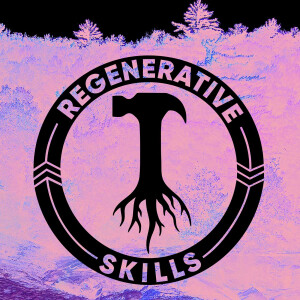
Friday Jul 15, 2022
Friday Jul 15, 2022
Welcome back to this ongoing series on tree planting and agroforestry. This week will be the first of a two part interview I did with Philipp Gerhardt, the founder of the website baumfeldwirtschaft.de (which translates basically to tree farming) and managing director of Deutsche Agroforst GmbH. He is considered a leading expert for keyline design in Central Europe and is active in research projects and as a lecturer in seminars. As a pioneer in agroforestry, he has developed new approaches with his team to implement modern agroforestry and water management systems. Together they develop holistic concepts for protection against drought and floods for companies or municipalities with elements from Keyline Design and regenerative agriculture, and climate-friendly forest conversion. He has advised numerous companies that are changing the landscape in the long term and are building new climate-friendly ways of doing business.
I first got to know Philipp in person while I was working with our team at Climate Farmers to organize our conference last year. I was thrilled to find him in our group of agroforestry nerds and learned so much from him in just a few days. One of my highlights from the event was getting to listen in on the conversations Philipp and Mark Shepard had about the history and evolution of forestry science, and I knew that I had to get Philipp on an episode one day.
Well it finally happened and the result was an hour and a half conversation that I’ve split into two parts in which Philipp and I explore both high level concepts of integrating trees into agricultural landscapes and the role they play in restoring the healthy function of the hydrological cycle to the land, all the way to detailed stories of case studies and projects that Philipp and I are working on.
Join the discord discussion channel to answer the weekly questions and learn new skills with the whole community
Links:
http://baumfeldwirtschaft.de
https://www.youtube.com/c/Baumfeldwirtschaft
https://www.instagram.com/baumfeldwirtschaft/
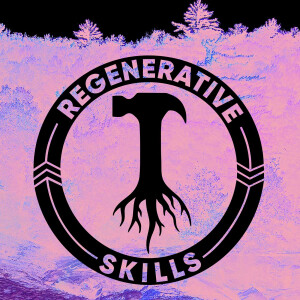
Friday Jul 08, 2022
Friday Jul 08, 2022
Welcome to a special episode edition of this ongoing series focusing on tree planting and agroforestry. So far I’ve had a lot of interviews talking about tree and perennial systems and we’ve mostly looked at things from a macro perspective. Today we’ll take a closer look at one of the most incredible families of plants that are present in the majority of temperate ecologies around the world, the family Quercus, more commonly known as oaks.
Here to give us a window into the undervalued world of oak trees as well as a glimpse into how humans have formed relationships and uses for this incredible plant that have shaped our own cultures and evolutionary trajectory is Byron Joel an internationally recognised author, media presenter and leader in the field of Ecological-Agriculture.
For over 15 years he has worked, consulted, designed and taught across four continents. In 2011 he was resident Manager of Horticulture at the PERMACULTURE RESEARCH INSTITUTE OF AUSTRALIA and in 2012 transitioned to the same position at the sister institute in New Zealand. He has over 1000 hours teaching and presenting on regenerative agriculture in Australia, the USA, Africa and New Zealand.
Byron acts as managing consultant for Oak Tree Designs, assisting in the greater eco-agricultural movement as systems designer and consultant, focussing on the Mediterranean regions of his home nation, Australia, where he advocates for a greater recognition, honoring and implementation of Indigenous Australian land stewarding practices.
This is a special episode, much the same as last week, because it comes from one of my favorite episodes from one of my favorite podcasts, The Plant Report with my dear friend Jill Cloutier. The Plant Report is an educational podcast about plants, herbal medicine, ethnobotany and the human-plant relationship highlighting the fact that every plant has a story.
Jill has such a wealth of knowledge and love for plants herself that when she gets together with others to talk about the wonderful world of vegetative life you can count on podcast magic. Since I can hardly hope to improve on Jill’s exceptional interviewing style from her two shows, The Plant Report and Sustainable World Radio, I reached out to ask if she would allow me to rebroadcast her session with Byron and she generously agreed.
Jill and I, along with our friend and colleague Scott Mann from The Permaculture Podcast have teamed up to form the Regenerative Media Alliance, a union of independent media producers working to broadcast regenerative solutions across the world. If you’re interested in learning from seasoned pros in independent regenerative media production, be sure to stick around until the end where I’ll share more information about this alliance and give you the early signup information for the RMA’s professional development conference.
Join the discord discussion channel to answer the weekly questions and learn new skills with the whole community
Links:
https://oaktreedesigns.com.au/
https://www.instagram.com/oak_tree_designs/
https://www.youtube.com/watch?t=3&v=AWIx9kc7Hw4&feature=emb_imp_woyt
https://www.williambryantlogan.com/oak
https://oaktreedesigns.com.au/dehesa-australis/
https://theplantreport.libsyn.com/
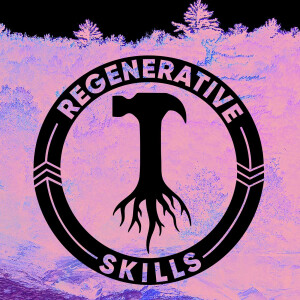
Friday Jul 01, 2022
Friday Jul 01, 2022
Welcome to a special episode edition of this ongoing series focusing on tree planting and agroforestry. Often when we think about agroforestry we think first about food. Orchards of fruit and nut crops are certainly an important aspect of agroforestry, but so is the responsible harvesting and care for woodlands for building materials and fuel. For a long time now I’ve admired the work of Ben Law who’s a woodsman, permaculture practitioner, and author of many books on developing, tending, and using the products that come from the woods.
Ben is a wealth of practical knowledge and is a founding member of the Forest Stewardship Council. He also has worked for Oxfam as a permaculture consultant. He’s also the author of The Woodland Way: A Permaculture Approach to Sustainable Woodland Management.
Ben’s woodland house has been featured on The World’s Greenest Homes, a series of the Discovery Channel’s Planet Green and his latest book, Roundwood Timber Framing, is a full color guide to his beautiful and traditional building techniques.
This is a special episode today, because it comes from the archives of one of my favorite podcasts, one that helped to inspire me to begin my own back in the early days. Since I can hardly hope to improve on my friend Scott Mann’s exceptional interviewing style in the Permaculture Podcast, I reached out to him to ask if he would allow me to rebroadcast his interview with Ben and he generously said yes.
Scott and I, along with our friend and colleague Jill Cloutier from Sustainable World Radio have teamed up to form the Regenerative Media Alliance, a union of independent media producers working to broadcast regenerative solutions across the world.
Be sure to stick around until the end where I’ll share more information about this alliance and give you the early signup information for the RMA’s professional development conference.
In this interview, Ben and Scott discuss a wide range of woodland management ideas and options like coppicing and pollarding. Ben describes some of the valuable skills and products that can be central to profitable forest management or forest based businesses. Overall I really love this conversation for the mindset that comes through from Ben as he describes his deep relationship with the woodland that he stewards and I hope that it helps you to look at the forest in a deeper way as well.
Join the discord discussion channel to answer the weekly questions and learn new skills with the whole community
Links:
https://ben-law.co.uk/
https://ben-law.co.uk/product-category/books-dvds/
https://www.thepermaculturepodcast.com/web/
https://regenerativemediaalliance.com/
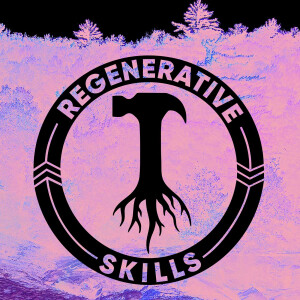
Friday Jun 24, 2022
Friday Jun 24, 2022
Welcome back to this ongoing series on tree planting and agroforestry. As I’ve been researching this topic for years I’ve begun to see a spectrum of tree planting concepts that look like a gradient based on the diversity in the system. On one extreme you have monoculture orchards and timber plantations which are just a single species on large tracts of land, and on the other extreme you have syntropic agroforestry for productive systems and what are known as Miyawaki forests for native reforestation initiatives.
In both cases these are very densely planted areas of tens or even hundreds of different species. In both cases the idea is to accelerate the succession and maturation of the system by leveraging the diversity of plant communities to mimic natural forests to promote growth and resilience in the plantation.
In today’s episode we’re going to take a deep dive into the world of Miyawaki forests with Hannah Lewis, the author of the new book, “Mini-Forest Revolution.” Hannah Lewis is a writer focusing on people, nature, and conservation. She edits the Compendium of Scientific and Practical Finding Supporting Eco-Restoration to Address Global Warming, published by Biodiversity for a Livable Climate, an environmental nonprofit based in Cambridge, Massachusetts. Born and raised in Minneapolis, Minnesota, she discovered the Miyawaki Method and wrote Mini-Forest Revolution while living with her partner and their two children in France.
In this episode we’re going to get into the history of Akira Miyawaki, the visionary scientists and ecologist behind the tree planting method. We’ll also break down the details of what makes this way of planting native forests so effective and revolutionary, from the deep research required to create a planting list, how to prepare the ground to ensure the trees get off to a healthy start, how to maintain the planted area as it gets established and a lot more.
We also explore the powerful community building potential of getting people together to replant degraded areas, so make sure to listen all the way to the end when Hannah gives her advice on how to start a Miyawaki forest for yourself.
Join the discord discussion channel to answer the weekly questions and learn new skills with the whole community
Links:
https://www.chelseagreen.com/product/mini-forest-revolution/
https://www.youtube.com/c/AfforesttGlobal
https://regenerativeskills.com/how-to-grow-a-healthy-native-forest-in-record-time-with-afforestt-founder-shubhendu-sharma-146/









